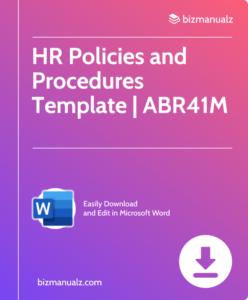Who Writes Employee Policies and Procedures for a Company?

Creating and implementing good employee policies and procedures is vital. They outline acceptable behavior, expectations, and the rules for various aspects of employment. They help promote consistency, clarity, and fairness within and organization. Who writes employee policies and procedures for a company?
The Importance of Employee Policies and Procedures
HR teams, with knowledge and understanding of employment laws, work together with legal experts to ensure the policies align with current legislation and protect both employees and the organization. Subject matter experts from other departments, like finance, operations, and IT, may add their insights to reflect their particular needs.
An external perspective helps too, with best practices or model policies from industry associations, trade unions, or professional networks. Remember to review and update policies regularly, to keep up with changes in laws or business practices.
According to SHRM.org, 70% of organizations update their employee handbooks annually. This ensures compliance with legal requirements and a positive working environment.
HR ensures everyone knows the ‘rules’ by crafting employee policies and procedures. They provide clear guidance on what’s expected in terms of behavior, performance, and ethics. This outlines the company’s values. It creates a shared understanding among staff.
These documents promote consistency. They establish uniform practices across departments and teams. This reduces confusion and ensures everyone works towards the same goals.
Employee policies and procedures help organizations comply with legal regulations and industry standards. They provide the necessary actions to be taken in various situations. This minimizes the risk of legal disputes or non-compliance penalties.
These documents are not static. They’re continuously reviewed and updated to fit changing circumstances. This lets organizations stay agile in a dynamic business landscape.
Employee policies and procedures play and important role. To reap the benefits, businesses need to invest time and resources into developing well-crafted documents. This streamlines operations, fosters a positive work culture, mitigates risks, and boosts organizational performance.
Take action now! Prioritize the development of solid employee policies and procedures that align with the company’s values. This will create a strong foundation for success while guarding against potential pitfalls. Let your policies lead your team to success!
The Role of HR Department in Writing Employee Policies and Procedures
The HR department is vital for creating employee policies and procedures. They design the guidelines that govern the actions of employees in and organization.
The HR team carefully considers many things when formulating these policies. They look into industry standards, legal requirements, and best practices to make sure the policies are just, compliant, and effective.
Moreover, they involve key stakeholders like management, legal advisors, and other departments to get input and suggestions. This helps create policies that fit with the company’s values and objectives while addressing specific needs and issues.
One unique feature of policy formation is the focus on consistency and clarity. The HR department makes sure all policies are written clearly and understandably. This helps employees know their rights, duties, and the consequences of not following the rules.
A great example of how good policy writing matters is a tech startup. Employees were uncertain about remote work arrangements. The HR department provided a comprehensive remote work policy. It explained eligibility criteria, communication protocols, productivity measurements, equipment provision, and cybersecurity steps. This policy clarified doubts and established a smooth process for remote work requests.
Involvement of Management and Executives
Management and executives are key players in devising employee policies and procedures. They bring their expertise, leadership alignments, risk mitigation measures, and communication channels to the table. Additionally, their input customizes policy-making to meet specific needs.
To make this process more effective, here are a few suggestions:
- Include reps from different departments.
- Clearly communicate policy changes or updates.
- Regularly review policies based on feedback.
- Provide comprehensive training programs.
These suggestions help management enhance their involvement in policy-making and create and uplifting work environment. Their contribution ensures that employee policies and procedures are aligned with the organization’s goals and values. So, forget the kings and queens of Monday mornings – these are the real MVPs!
Outsourcing the Development of HR Policies and procedures
Expertise: Get quality services with the help of professionals who have deep understanding of the field.
Consistency: Rely on external advisors to make policies that comply with industry standards and legal requirements.
Efficiency: Save time and resources by getting specialized teams to do thorough research, avoiding trial-and-error methods.
Impartiality: An outsider’s view helps to avoid internal biases and create fairer policies that meet different employee needs.
Flexibility: Outsource and organizations can swiftly adjust to changing regulations or market conditions, preserving policy integrity.
Furthermore, outsourcing promotes collaboration between internal individuals and external specialists for the creation of policies that are a balance between organizational objectives and staff welfare. Outsourcing employee policy development brings advantages such as expertise, consistency, efficiency, impartiality, and flexibility.
Companies should take advantage of this approach to improve their policy frameworks and keep up with the ever-evolving business arena. Make sure you don’t miss the chance to strengthen your organization’s foundation by outsourcing policy development now!
The Role of Legal Professionals
Legal professionals are key to creating employee policies and procedures. They make sure these policies are compliant with all relevant laws and regulations. Researching, analyzing laws, and giving guidance on best practices are their responsibilities.
They draft policies which cover conduct, safety, discrimination and harassment prevention, and disciplinary measures. They take into account the company’s needs and industry standards. Consulting with stakeholders gives them insights to make the policies effective.
Not only do legal professionals create policies, they also review them for any updates or changes. This keeps the company compliant and provides a fair and inclusive work environment.
Pro Tip: Always consult legal professionals who specialize in employment law for policies and procedures. Their expertise helps companies understand complex laws and protect their interests. Get employee input too: staff know best how to work around policies!
The Importance of Employee Input and Feedback
Employee input and feedback are key for crafting successful policies and procedures in a business. By involving employees, the organization gets the advantage of their knowledge, background, and different views. This shared approach guarantees that the policies and procedures are all-inclusive, useful, and reflect the organization’s culture.
When staff members are able to give their opinion on policy creation, they feel appreciated and strong. This helps management to recognize potential issues and see where changes can be made. This feedback helps to make policies that are not only just and clear, but also fit with the desires and goals of the team.
In addition, employee input encourages a feeling of responsibility among workers. When they are involved in making policies and procedures, they are more likely to understand and obey them. This creates a good work ambiance where each person is answerable for their deeds, resulting in greater productivity and job pleasure.
An impressive example of the importance of employee input is visible in Google’s history. Google has always been known for having a culture of invention, where employees are encouraged to voice their thoughts.
One clear example of this is the “20% Time” policy, which allows employees to use 20% of their working hours on personal projects that may be useful to the company. This policy was suggested by and employee and accepted by higher management. It not only led to successful products like Gmail, but also showed how employee input can lead to big organizational improvements.
Remember, the person who makes employee policies and procedures for a company can either make staff feel like prisoners or make lawyers feel like they’re in a magical kingdom.
Writes Employee Policies and Procedures
Employees policies and procedures are key for a company to function smoothly. They provide directions and expectations for staff, creating consistency and efficiency. A team or department in HR or legal affairs usually writes them.
The process starts with researching related laws, regulations and industry standards. Then, the team forms a structure that meets the company’s objectives, values and culture. This involves drafting policies on conduct, benefits, appraisals, holiday rules, disciplinary action and more.
The policies and procedures have to be checked by legal experts and senior management for compliance with laws. When they are approved, they are shared with staff through employee handbooks or internal messaging systems.
It’s essential to remember that these policies and procedures might change due to changes in legislation or business. Regular updates are necessary to keep them relevant and effective.
Frequently Asked Questions

Q: Who is responsible for writing employee policies and procedures for a company?
A: The Human Resources (HR) department is typically responsible for writing employee policies and procedures for a company. They ensure that the policies are compliant with labor laws and industry regulations.
Q: What qualifications do HR professionals need to have to write employee policies and procedures?
A: HR professionals should have a good understanding of employment laws, company culture, and industry best practices. They should also have strong communication and writing skills to effectively convey the information in the policies and procedures.
Q: Are there any external resources or consultants that can help in writing employee policies and procedures?
A: Yes, some companies may hire external HR consultants or legal professionals to assist in writing employee policies and procedures. These experts can provide expertise and ensure compliance with applicable laws.
Q: How often should employee policies and procedures be reviewed and updated?
A: It is recommended to review and update employee policies and procedures at least once a year or whenever there are significant changes in labor laws, industry regulations, or company policies. Regular reviews help to ensure accuracy and relevance.
Q: Can employees provide input or suggestions for policies and procedures?
A: Yes, companies often encourage employee participation by allowing them to provide input or suggestions for policies and procedures. This can be done through employee surveys, suggestions boxes, or feedback sessions to ensure policies reflect the needs and concerns of the workforce.
Q: How are employee policies and procedures communicated to the employees?
A: Employee policies and procedures are typically communicated through and employee handbook that is distributed to all employees. Additionally, companies may utilize email communications, intranet portals, or training sessions to ensure that employees are aware of the policies and procedures.

















Leave a Reply